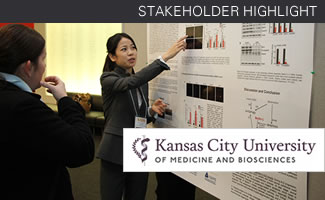
Every day, medicine faces new and potentially devastating challenges. Innovative research and evidence-based medicine are keys to ensuring quality health care delivery for millions of patients around the world.
The Kansas City University of Medicine and Biosciences (KCU) is dedicated to advancing scientific knowledge through increased focus on biomedical and translational research. In recent years, KCU has made substantial investments to further development of the University’s research program and take advantage of funding opportunities by creating collaborations with other local research organizations.
 “KCU is on an exciting course to strengthen our research enterprise, as well as develop new opportunities to enhance student research, including the College of Biosciences master of science thesis research” said Jeffrey Joyce, PhD, KCU vice president for research. “Kansas City’s research community and organizations like the Kansas City Area Life Sciences Institute are key to KCU’s future in research. By collaborating with others, we can achieve greater outcomes than we would be capable of as individual institutions.”
“KCU is on an exciting course to strengthen our research enterprise, as well as develop new opportunities to enhance student research, including the College of Biosciences master of science thesis research” said Jeffrey Joyce, PhD, KCU vice president for research. “Kansas City’s research community and organizations like the Kansas City Area Life Sciences Institute are key to KCU’s future in research. By collaborating with others, we can achieve greater outcomes than we would be capable of as individual institutions.”
One such recent investment was KCU’s hiring of Jingsong Zhou, PhD, and her research team. Dr. Zhou and her team are federally funded and internationally renowned for their work in neuromuscular diseases, particularly ALS. To support their research, KCU purchased the region’s highest-resolution confocal laser scan microscopy system. The confocal microscope allows investigators to image subcellular structures inside individual cells, as well as show dynamic interaction between intracellular organelles when used with live cells.
KCU also continues to strengthen collaborative research efforts with local and national organizations, including other KCALSI stakeholder institutions. These relationships include partnerships with regional institutions that allow students in KCU’s College of Biosciences to complete research projects in partners’ laboratories.
Additionally, faculty researchers serve as mentors to the next generation of physicians and scientists through their work with KCU students. Areas of particular focus include neurodegenerative diseases, cardiovascular disease, hematologic disorders, primate behavior and physiology, and the role of health disparities in health outcomes.
KCU’s commitment to research represents another way the University is working toward fulfilling its mission of “improving the well-being of the communities we serve.”